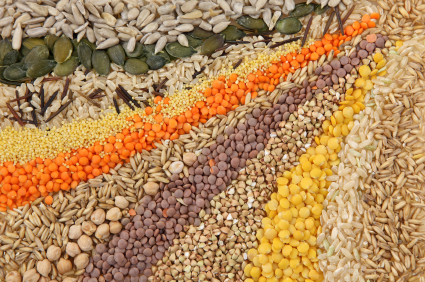Summary: According to the draft to the seed
law in China, the number of crops that require verification has reduced from 28
to 5. There is a heated debate within the seed industry on whether to replace
the seed variety verification system with a registration system. This article
presents the different viewpoints.

Source: Internet
Although the National People's Congress has stopped soliciting for opinions for
the draft to the Seed Law of the People's Republic of China (Amendment),
discussion about the new law is continuing, especially regarding the seed
variety verification system reform.
According to the draft to the seed law, the number of crops that require
verification has reduced from 28 to 5: rice, wheat, corn, cotton and soybean.
For these, experts have different views. Some believe that the variety
verification system must be canceled in order for the Chinese seed industry
become market-oriented. Others, however, insinuate that this is not a good time
to cancel the variety verification system.
Some insiders believe that the seed market is highly liberalized and that the
modern seed industry evolved. Therefore, the disadvantages will outweigh
advantages if China persists in variety verification system.
Firstly, the variety verification system cannot fully reflect the market demand
and it severely stifles seed enterprises' initiative in developing seed
varieties. Crop varieties that have been bred or improved by seed enterprises
cannot enter the market if they are not verified, even if there is a market
demand for these unverified crop varieties. This results in wasted effort and
money, and discourages enterprises from innovating. Also, this prevents seed
enterprises from fully implementing their variety strategies as planned, which
impedes the development of the company.
Secondly, the variety verification system is not carried out in a proper and
scientific manner during variety tests (the middle link in the variety
verification procedure) and in the zoning of suitable planting areas for crop
varieties.
Thirdly, the variety verification system is a breeding ground of corruption. Companies
have been known to bribe officials in order to pass verification tests. This
problem is deep-rooted.
Fourthly, the variety verification system has become a shelter for immoral seed
enterprises to sell defective seeds. This is a severe side-effect of
corruption.
Therefore, some insiders think that it is time to cancel the current variety
verification system based on the premise that the protection for plant variety
rights should be enhanced. They suggest adopting the international registration
system which will focus on the specificity, conformity and stability of
varieties, and the market-demand for authentic products. This would enable seed
enterprises to innovate and to be proactive in variety research and
development. Also, the international registration system would punish seed enterprises
for selling defective seeds.
However, others believe that this is not the right time to cancel the variety
verification system. They argue that the major crops play an important role in
livelihoods and national interests. The variety verification is key to managing
the major crops.
First of all, China's seed market is relatively dispersed and seed enterprises
do not have the ability to be responsible for their own varieties.
Secondly, most farmers cannot make the correct choices when faced with multiple
varieties in the market.
Thirdly, a variety registration system has not yet been developed in China
and it is too early to replace the variety verification system with a
registration system. It is worth noting that some insiders who hold such
opinions believe that the variety verification system is bound to be eliminated
in the future and they think that it is still too early to cease the verification
system.
Other insiders have proposed a gradual reform. Some think that a unified
regional test and concentrated verification system for major crops should be introduced.
Major crops only include corn, rice and wheat, and do not include soybean and
cotton. This is because the planting area of soybean is small, and cotton
planting is concentrated into a few provinces. Some suggest to initially have
casual inspections conducted by verification institutes on seed enterprises,
from which a registration system can gradually develop.
CCM believes that the variety verification system must be eliminated now. Seed
variety is vital for a seed company's development. However, the variety
verification system has severely stifled seed companies' initiative in
developing new seed varieties. For example, in China, many seed companies are
regional and the varieties they have bred only have good performance in their
local areas and cannot be promoted to other regions. Almost all of these
varieties cannot be verified. This results in wasted effort and money, and
discourages enterprises from innovating.
Admittedly, all reforms will lead to market fluctuation to some extent, but law
making must go ahead. If the variety verification system cannot be eliminated
now, China's seed industry will fall behind.
If you want to know more about information about seed in China, you can enter our Online Platform for it. It mainly concludes:
-
Enormous information: You can enjoy all products (newsletters, reports) worth hundreds of million dollars with only the price of one report.
-
Trend forecast and monitoring: You are able to forecast the output, consumption, price and trend of the targeted products.
BOON: Now you can enjoy the free trial in the Online Platform for 7 days. If needed, welcome to contact us directly by emailing econtact@cnchemicals.com or calling +86-20-3761 6606.